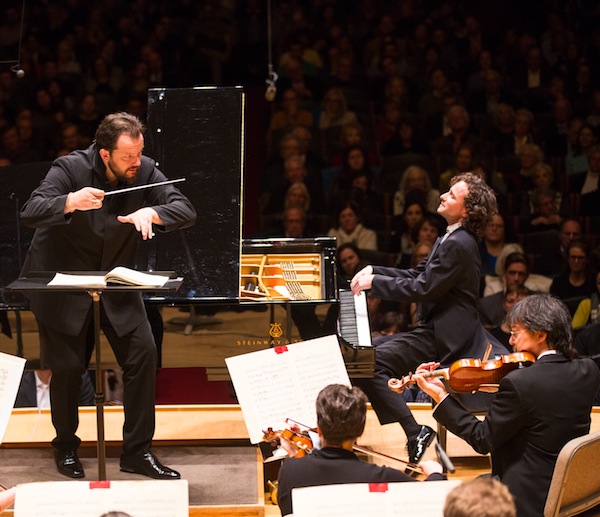Nelsons, Helmchen find fresh vitality in Beethoven and Mahler with BSO

Martin Helmchen performed Beethoven’s Piano Concerto No. 3 with Andris Nelsons and the Boston Symphony Orchestra Thursday night. Photo: Robert Torres
Beethoven’s piano concertos have been the vehicles of choice for many pianists visiting Symphony Hall this fall. In September, Paul Lewis offered a graceful and thoughtful account of the Fourth Piano Concerto with the Boston Symphony Orchestra, and the composer’s First will be the focus of Rudolf Buchbinder’s performance with the ensemble next week.
Thursday night it was Martin Helmchen’s turn with the Piano Concerto No. 3. Music director Andris Nelsons, filling in for Christoph von Dohnányi, who is still recovering from a fall suffered earlier this year, was on the podium.
Beethoven considered his Third Piano Concerto to be his first great work in the genre. Mozart’s concertos, particularly No. 24 in C minor, remained a model, but Beethoven’s work combines lyrical grace with a sense of turbulence that is uniquely the composer’s own.
The work could have had no better advocate than Helmchen. The German pianist is a musician of sparkling technique and probing musical intelligence, and his performance was well attuned to the work’s trickling elegance and surging intensity. Throughout his reading he conjured lines of crystalline precision and played with a clear, ringing tone well suited to Beethoven’s edgy style.
In the outer movements, his touch resulted in passages of classical finesse more than romantic reverie. But there were many colorful moments. The second theme of the first movement was shaped with a hint of darkness, and the cadenza, Beethoven’s own, sounded with pearly depths.
The second movement was imbued with a searching lyricism, with Helmchen’s tone taking on a dark, chant-like quality. Soft solos from the BSO woodwinds framed Helmchen’s cascading lines. Under Nelsons’ guide, the orchestra supplied a sensitive and well-balanced accompaniment. The strings, in particular, rendered Beethoven’s phrases with resonant warmth.
Thursday’s revised program with an offering of Mahler’s Symphony No. 1 was a less adventurous alternative to Dohnányi’s originally scheduled program of works by Bartók and Janáček. Nelsons had recently led the same work in the season’s opening subscription concerts this past September, and the symphony served as part of the orchestra’s recent Japanese tour.
But any dissatisfaction with the programing stopped there, for Nelsons delivered an account of the work that had all of the bold energy and plush lyricism of its best recent performances.
Mahler’s music is a journey in sound, and Nelsons was a superb tour guide who took time to craft each section of the work with care. The quotation of Mahler’s song “Ging heut’ Morgen über’s Feld” in the first movement glowed like a sunrise, and woodwind calls conjured warm images of spring.
The second movement’s Ländler had a rustic vitality with the strings rendering their phrases with the verve of a village band. The Trio, shaped with generous rubato, had a tasteful Viennese lilt.
Edwin Barker’s bass solo in the opening of the third movement shaded the music with a touch of silver, and the lines of “Bruder Jakob” unfolded in a doleful march. The movement’s Klezmer- like section provided a bright contrast, and the music central to the movement took on a heavenly glow.
The finale coursed with dramatic power, and the closing theme, performed by the BSO brass, culminated in a thick wall of sound. When played as vividly as this, Mahler’s music never seems to get old.
The program will be repeated 1:30 p.m. Friday and 8 p.m. Saturday at Symphony Hall. bso.org; 888-266-1200.
Posted in Performances




